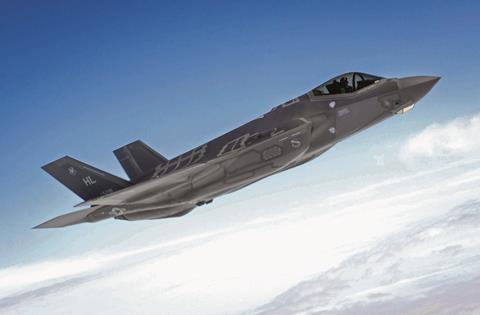The US Air Force has taken out of service the majority of its Lockheed Martin F-35As due to a problem with the jets’ pilot ejection systems.
For the same reason, it has also halted flights of Beechcraft T-6s and Northrop T-38s, which the service uses to train new pilots.
The USAF confirmed the flight bans on 29 July. It says the “majority” of USAF F-35As are affected but does not specify an exact number. The USAF operates 347 of the fifth-generation fighters.

The issue involves problems with explosive cartridges in ejection systems supplied by aerospace company Martin-Baker, it adds.
“This is a temporary stand down, not a fleet-wide grounding,” the USAF says. “There is a concern with a component used in the pilot ejection system of several aircraft. Units are currently inspecting the systems to mitigate safety concerns.”
Martin-Baker could not be reached for comment.
Lockheed tells FlightGlobal it is “assisting with seat inspections where appropriate”. The issue applies to all Martin-Baker ejection seats on US Department of Defense aircraft, meaning it is not an F-35-specific issue, Lockheed adds.
The USAF specifies that the no-fly orders came from specific USAF commands, including its Air Combat Command (ACC) and Air Education and Training Command (AETC). An actual fleet-wide grounding would come from higher in the USAF’s command chain, it adds.
The ACC is the USAF’s “lead command” for F-35As, the service adds.
On 19 July, the ACC started an effort to inspect “all of the cartridges on the ejection seats of its F-35s”, the command says. “ACC’s F-35s have Martin-Baker ejection seats.”
“Out of an abundance of caution, ACC units will execute a stand-down on July 29 to expedite the inspection process,” the ACC adds. “Based on data gathered from those inspections, ACC will make a determination to resume operations.”
Separately, the AETC grounded its T-38s and T-6s on 27 July due to a “quality defect in the manufacture of explosive cartridges used in the escape systems”, it says.
The AETC adds that the Air Force Material Command identified the “specific lot numbers of product that require inspection”.
It estimates the problem affects 203 T-38s (about 40% of that fleet) and 76 T-6s (15% of the fleet), including aircraft at each of its bases and at Naval Air Station Pensacola in Florida.
“Those specific aircraft will remain under a temporary stand down until maintenance can confirm that the escape systems are fully functional,” the AETC says. “We expect flying operations to resume with unaffected aircraft July 28.”
Major General Craig Wills, commander of the service’s 19th Air Force, says the grounding will “ensure the safety of our pilots and aircrew”.
“We will not return aircraft affected by this issue to the flying schedule until we’re confident their escape systems are fully function,” Wills adds.
Story updated on 29 July to include a statement from Lockheed Martin.


























